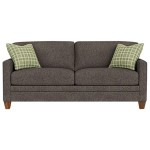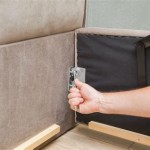Reupholstering Old Sofa: A Comprehensive Guide to Restoring its Grandeur
Reupholstering an old sofa is a smart investment that can restore its beauty and comfort while updating your home décor. Here's a comprehensive guide to navigate the process effectively:
1. Evaluate the Condition of Your Sofa
Before embarking on reupholstering, carefully assess the condition of your sofa. Is the frame sturdy and free of damage? Are the cushions supportive or flattened? If the frame is compromised or the cushions are worn beyond repair, it may be more cost-effective to consider a new sofa.
2. Choose the Right Fabric
The fabric choice significantly impacts the durability, comfort, and aesthetics of your reupholstered sofa. Consider the room's functionality, style, and traffic volume. Durable fabrics like leather, canvas, or performance fabrics are ideal for high-traffic areas. Delicate fabrics like silk or velvet add a touch of luxury but require careful maintenance.
3. Select a Reputable Upholsterer
Hiring a reputable upholsterer is crucial for a high-quality reupholstery job. Look for a professional with experience in reupholstering sofas similar to yours. Check for references, reviews, and a portfolio showcasing their workmanship. A skilled upholsterer can guide you in fabric selection and provide expert recommendations.
4. Prepare Your Sofa
Before handing over your sofa to the upholsterer, remove any cushions, pillows, or accessories. Protect the areas that will not be reupholstered, such as the legs or wooden trim, with masking tape or plastic wrap.
5. Stripping and Rebuilding
The upholsterer will meticulously strip the old fabric from your sofa, revealing the underlying frame. They will inspect the frame for damage and make necessary repairs. If required, they may replace springs, webbing, or foam to restore the sofa's structural integrity and comfort.
6. Upholstering the Sofa
Using the new fabric, the upholsterer will carefully create patterns and cut out pieces to fit the sofa's shape. They will attach the fabric to the frame using nails, staples, or glue, ensuring a snug fit and tailored appearance. The cushions will also be reupholstered, with new fillings added for added comfort.
7. Finishing Touches
Once the upholstery is complete, the upholsterer will add finishing touches to enhance the sofa's aesthetics. This may include adding trim, buttons, or piping to complement the new fabric and give it a polished look.
8. Aftercare and Maintenance
After reupholstering, follow the care instructions provided by the upholsterer. Regular vacuuming, spot cleaning, and professional cleaning as needed will help maintain the fabric's beauty and extend its lifespan.
Conclusion
Reupholstering an old sofa is a worthwhile investment that can revitalize its appearance and comfort. By following these steps and collaborating with a reputable upholsterer, you can restore your beloved sofa to its former glory while adding a touch of style and functionality to your home.

Vintage Sofa Reupholstery Of A Family Heirloom Willow Bloom Home

Vintage Sofa Reupholstery Of A Family Heirloom Willow Bloom Home

Vintage Sofa Reupholstery Of A Family Heirloom Willow Bloom Home

6 Projects Showing How To Reupholster An Old Sofa

Reupholstering My Grandmother S Antique Sofa Keefer Madness Wooden Set Designs

Reupholster Sofa Is The Cost Really Worth It Abakus

Do It Yourself Divas Diy Strip Fabric From A Couch And Reupholster

28 Ways To Bring New Life An Old Sofa Remodelaholic

The Perks And Perils Of Reupholstering Old Furniture

How To Reupholster A Couch Without Removing The Old Fabric Erfly House








